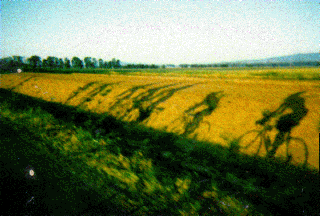Why Do We Ride?Webmaster's note: I originally wrote
this in 1995, but it's as heartfelt today as it was then. Why do you
ride? Let
me know. Looking back on the season, I'm once again afforded the opportunity ask myself, "Why?" It's not an easy question (although certainly one which my significant other often asks), but it's one that I often pose to myself as the miles tick slowly away on yet another Davis Double or Tour of Two Forests. What is the fascination with ultra endurance events? Why do so many cyclists find perfect happiness at shorter distances? What is it that draws me (and other ultra cyclists) to toe the line time after time, year after year, knowing as we do that the finish line is 200 miles and more than 12 hours of sweat and effort away?
The second clip is from "Apocalypse Now." In it, Martin Sheen's character is laying on a bed in a Saigon hotel, watching the ceiling fan spin. He contemplates sitting in the posh hotel, while his enemy, the Viet Cong, are waiting in the jungle. "I'm here getting weaker, and Charlie's out there, getting stronger," he tells himself. I think the combination of those scenes goes a long way toward explaining why this rider is drawn year after year to challenge myself with the Double Century series. Part of the reason, obviously, is that we all fear death, as Ms. Dukakis points out. Death, in this context, is not simply the final event, but a long process that begins somewhere around the time we tell ourselves that something else is more important than our health, that those extra pounds are OK, that everybody gets fatter and slower as they get older. After all, who needs to be able to ride that fast? Aren't there lots of people who don't exercise at all? Or much less than an ultramarathon athlete? Aren't they happy, too? Well, sure they are. Lots of people go through their entire lives doing little or nothing "healthy." My own grandfather lived into his 80s, after smoking unfiltered cigarettes all his life, drinking too much, and eating all the wrong kinds of foods. Living in Germany, he also climbed mountains until he was well into his 70s, putting younger men to shame. A recent news report on centenarians said that interviews with persons 100 and older revealed that very few of them followed any kind of regular diet or exercise regimen. They simply lived full lives, practiced moderation, and kept on living far past most people's lifespans. All of which would seem to argue that a "moderate" lifestyle is just fine. But I believe that we endurance cyclists (at least some of us) see something different. Having attained the height of fitness we are able to achieve, it's hard—almost impossible—to think about sliding back down the slope. Aside from the sheer ability to ride one's bike farther in a day than most people would like to drive a car is the realization that such an ability is an elusive quality. Stop riding, and the fitness goes fairly quickly. It's rather like tuning in a distant radio station while traveling on the highway. Leave your radio on the station, and you can continue to bring the signal in for hours. Change the channel, and you can't find it again. It's lost in static, and can't be dragged out of the airwaves. In this way, riding year after year becomes an effort to "stay tuned in" that distant station, to retain that elusive ability to keep turning the pedals after 99.99 percent of the population would have said "enough!" Which brings us to Martin Sheen and his unseen opponents. To the ultramarathon cyclist, the road is, if not an enemy, certainly an implacable player. The road, as Mr. Sheen might put it, is always out there. California's double centuries are "classics" in the sense that they all travel virtually the same course, year after year. And the roads they travel on, like the Viet Cong, are always there, waiting. The gradient on the Tour of Two Forests' Cardiac Hill will always be the same; the steepness of the Davis Double's Resurrection Grade will never change. The hills, the miles, are always there, waiting, never getting weaker. They care not a whit about why you didn't train last week, or why you're riding slower this year. "Come," they say, "We're still the same. How are you?" The roads--the DC courses--thus become benchmarks against which to measure oneself. Rode the course in 13 hours last year? How will this year compare? Have we started sliding back down the slope? Or are we still dug in at the height we managed to scramble to last year? The roads don't lie, nor do your legs, or your lungs, or your back. Afraid of death? Guess what. He's there at the back of the pack somewhere, waiting for you to slow down. He's beckoning from all the rest stops and the sag wagons; he's the back fence that needs mending, the ride that you don't do because you're too busy or too complacent or too willing to watch the summit recede. So it is that some of us feel we have in our hands the ability to cheat death for a while, not by chasing a younger suitor, but by fooling the old ‘reaper. He may be there, waiting at the back of the pack, but we're still riding at the front, still grinding up the hills while he skulks in the lowlands. Give up riding? Slow down? Ride less? Hey, it's devil-take-the-hindmost, and we're not playing that game.
|
